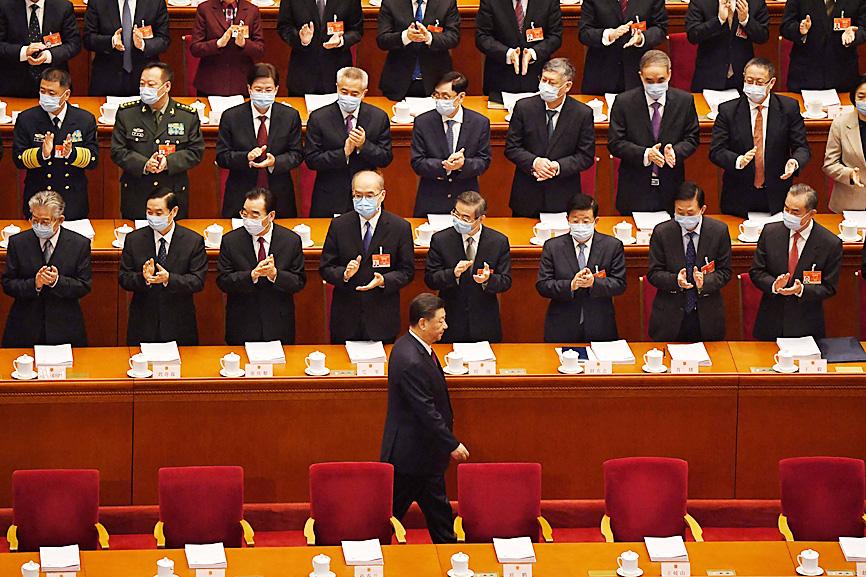China yesterday projected defense spending growth of 6.8 percent this year, while saying that it would deter any “separatist activity” from Taiwan, but remain committed to promoting cross-strait relations.
Beijing has increased its military activity near Taiwan in the past few months, responding to what it calls “collusion” between Taipei and Washington, the nation’s main international backer and arms supplier.
At the opening of the annual Chinese National People’s Congress, Chinese Premier Li Keqiang (李克強) said that Beijing stands by its “one China” principle, which states that Taiwan is part of China.

Photo: AFP
China remains committed “to promoting the peaceful growth of relations across the Taiwan Strait and China’s reunification,” he told about 3,000 delegates at the Great Hall of the People in Beijing.
“We will remain highly vigilant against and resolutely deter any separatist activity seeking Taiwan independence,” Li said.
“We will promote exchanges, cooperation and integrated development across the Taiwan Strait. Together we can shape a bright future of rejuvenation for our great nation,” he added.
The Mainland Affairs Council in Taipei responded by urging China to begin “benign” interactions with it to gradually resolve disagreements through communications.
The council said the government would continue to resolutely defend its sovereignty and Taiwan’s democracy and freedom, and that healthy and orderly exchanges were better than “enforced” pressure.
Also at the conference, the Chinese Ministry of Finance said it would bolster the country’s defense spending 6.8 percent this year, the largest gain since 2019, amid tensions with the US and key neighbors.
Military expenditure is expected to climb to 1.35 trillion yuan (US$208.03 billion) in the coming year, the ministry said.
The figure compares with a projected rise of 1.8 percent in budgeted fiscal spending.
A Bloomberg calculation of the latest defense budget number shows spending for this year would actually rise 6.9 percent.
“We will provide stronger financial guarantees to vigorously support the modernization of national defense and the armed forces, and help China’s defense capabilities rise in step with its economic strength,” the ministry said in a report.
The spending boost comes after China sparred with India on its border and as the nation seeks to modernize its military to make it more competitive with the US.
“We will boost military training and preparedness across the board, make overall plans for responding to security risks in all areas and for all situations, and enhance the military’s strategic capacity to protect the sovereignty, security and development interests of our country,” Li said.
“Considering Beijing’s threat perceptions and goal of achieving military modernization by 2035, I’d expect defense spending to continue to be a priority,” said Meia Nouwens, a senior fellow at the International Institute for Strategic Studies.

NATIONAL SECURITY THREAT: An official said that Guan Guan’s comments had gone beyond the threshold of free speech, as she advocated for the destruction of the ROC China-born media influencer Guan Guan’s (關關) residency permit has been revoked for repeatedly posting pro-China content that threatens national security, the National Immigration Agency said yesterday. Guan Guan has said many controversial things in her videos posted to Douyin (抖音), including “the red flag will soon be painted all over Taiwan” and “Taiwan is an inseparable part of China,” while expressing hope for expedited “reunification.” The agency received multiple reports alleging that Guan Guan had advocated for armed reunification last year. After investigating, the agency last month issued a notice requiring her to appear and account for her actions. Guan Guan appeared as required,

A strong cold air mass is expected to arrive tonight, bringing a change in weather and a drop in temperature, the Central Weather Administration (CWA) said. The coldest time would be early on Thursday morning, with temperatures in some areas dipping as low as 8°C, it said. Daytime highs yesterday were 22°C to 24°C in northern and eastern Taiwan, and about 25°C to 28°C in the central and southern regions, it said. However, nighttime lows would dip to about 15°C to 16°C in central and northern Taiwan as well as the northeast, and 17°C to 19°C elsewhere, it said. Tropical Storm Nokaen, currently

‘NATO-PLUS’: ‘Our strategic partners in the Indo-Pacific are facing increasing aggression by the Chinese Communist Party,’ US Representative Rob Wittman said The US House of Representatives on Monday released its version of the Consolidated Appropriations Act, which includes US$1.15 billion to support security cooperation with Taiwan. The omnibus act, covering US$1.2 trillion of spending, allocates US$1 billion for the Taiwan Security Cooperation Initiative, as well as US$150 million for the replacement of defense articles and reimbursement of defense services provided to Taiwan. The fund allocations were based on the US National Defense Authorization Act for fiscal 2026 that was passed by the US Congress last month and authorized up to US$1 billion to the US Defense Security Cooperation Agency in support of the

PAPERS, PLEASE: The gang exploited the high value of the passports, selling them at inflated prices to Chinese buyers, who would treat them as ‘invisibility cloaks’ The Yilan District Court has handed four members of a syndicate prison terms ranging from one year and two months to two years and two months for their involvement in a scheme to purchase Taiwanese passports and resell them abroad at a massive markup. A Chinese human smuggling syndicate purchased Taiwanese passports through local criminal networks, exploiting the passports’ visa-free travel privileges to turn a profit of more than 20 times the original price, the court said. Such criminal organizations enable people to impersonate Taiwanese when entering and exiting Taiwan and other countries, undermining social order and the credibility of the nation’s